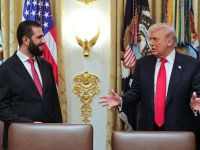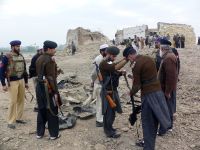Arab states geared up Wednesday for their first summit in four years, former outcast Iraq backing the others in saying it should be devoted "heart and soul" to the Palestinian struggle.
Iraqi and other Arab ministers were arriving here in preparation for the Saturday-Sunday summit, which comes hot on the heels of the Sharm el-Sheikh summit that resulted in a US-brokered truce between Israel and the Palestinians.
Foreign Minister Sahhaf of Iraq, invited to the summit for the first time since it invaded fellow Arab state Kuwait in 1990, promised not to raise its demand for help in lifting the UN sanctions imposed after the invasion.
Sahhaf, who will take part in a two-day foreign ministers meeting designed to prepare the summit, recognized the meeting should be "devoted heart and soul to supporting the Palestinian struggle."
Vice President Ezzat Ibrahim is to represent Iraq on Saturday, in the absence of President Saddam Hussein who, for security reasons, has not travelled abroad since the invasion that triggered the 1991 Gulf War.
Kuwait has said it wants the agenda devoted entirely to "Jerusalem and the latest events in the Middle East," opposing suggestions that the summit might be a forum to discuss lifting the decade-old UN embargo against Iraq.
Besides Sahhaf, Kuwaiti Minister of State Soliman Majed al-Shahin were among the first ministers to arrive, along with top Palestinian official Faruq Qaddumi and Lebanese Prime Minister Salim Hoss.
Eighteen out of 22 members of the Arab League have so far confirmed their participation at the summit, at varying levels, said an official at the organisation's Cairo headquarters.
"We're ready to take decisive action," said Qaddumi, the Palestine Liberation Organisation's (PLO) political department chief, on arrival in Egypt Tuesday night.
The ministers were on Thursday and Friday to discuss the draft resolution to be submitted to Arab heads of state for their gathering at the Cairo International Conference Center.
"The most important thing is for us to object to the situation in Palestine," Egyptian Foreign Minister Amr Mussa said Wednesday, stressing the need for a "clear Arab line" on the recent Israeli-Palestinian violence.
But Qaddumi went further, calling for "a political and economic boycott of Israel" as well as United Nations sanctions "like there were on the former racist regime in South Africa."
Several Arab countries, meanwhile, criticized the Sharm el-Sheikh summit hosted by Egypt.
They complained it would pre-empt their own top-level meeting and other Arab efforts to confront Israel's killings of Palestinians in a wave of violence since September 28 that has claimed more than 110 lives.
After the truce accord announced by US President Bill Clinton, Arab League Secretary General Esmat Abdel Meguid pressed the United Nations to play a greater role in the Middle East peace process and urged Israel to stick to its commitments.
The three-point truce deal calls for Israel and the Palestinians to work for an immediate end to the violence, a fact-finding committee to be set up to look into the clashes and a revival of the peace process.
Ahead of the Cairo summit, Egypt criticized Libyan leader Moamer Kadhafi for revealing details of the draft resolution that has been drawn up for foreign ministers to debate.
Kadhafi told Qatar's Al-Jazeera satellite TV on Tuesday that he had received a copy of the draft and that it failed to propose any concrete action against Israel, limiting itself instead to condemnation of the Jewish state.
"(Arab leaders) are incapable of responding to the expectations of the Arab masses," said Kadhafi, who has not clarified if he will take part.
An Arab summit was also held in 1996, but Iraq was not invited.
Syrian President Bashar al-Assad had earlier stressed to US Secretary of State Madeleine Albright in Riyadh the extent of fury in the Arab world over Israel's action to quell the unrest.
"He thinks there is a lot of frustration and anger out there and that you have to take that into account," a senior US official said, referring to the Syrian leader -- CAIRO (AFP)
© 2000 Al Bawaba (www.albawaba.com)







